HOME >> WORLD
Google wins EU fight against worldwide ‘right to be forgotten’
Source:AFP Published: 2019/9/25 20:58:41

A view of Google's Beijing offices. File photo: VCG
Google is not required to apply an EU "right to be forgotten" to its search engine domains outside Europe, the EU's top court ruled Tuesday in a landmark decision.
The European Court of Justice handed victory to Google in the case, seen as crucial in determining whether EU online regulation should apply beyond Europe's borders or not.
The US internet giant had argued that the removal of search results required under EU law should not extend to its google.com domain or its other non-EU sites.
The court ruled that, while a search engine operator such as Google must carry out "de-referencing" of links as demanded by a regulator or court in an EU state to all European versions of its sites, that "right to be forgotten" did not need to go further.
"There is no obligation under EU law" for search engine operators such as Google "to carry out such a de-referencing on all the versions of its search engine," the court said.
But it did stress that de-referencing on EU sites must include measures to "seriously discourage" a European internet user being able to get around the "right to be forgotten" by accessing unrestricted results from a search engine on a non-EU domain.
That demands "geo-blocking," which Google says it already uses effectively in Europe. But it was unclear the legal battle over the issue is entirely over.
The French data regulator CNIL, whose fight since 2014 to have Google apply the "right to be forgotten" to all its search domains sparked the EU court case, reacted by saying the ruling did not expressly prevent it demanding worldwide de-referencing.
"If EU law does not impose global de-referencing, it does not forbid it either," CNIL said in a statement.
"As a result, a regulatory authority, and therefore CNIL, is competent to demand a search engine to de-reference results on all its search engine versions if that is justified, in certain cases, to guarantee the rights of the person concerned," it said.
CNIL also said it was up to France's highest court to deem whether Google's geo-blocking technology was sufficient.
CNIL in 2016 fined Google 100,000 euros ($110,000) for not complying with its order to apply the "right to forget" everywhere. The regulator argues that, for de-referencing to be effective on the internet, it must apply to all domains wherever they are. Google appealed to France's highest court, which in turn referred to the European Court of Justice, leading to Tuesday's ruling.
The EU court case was seen as pitting individuals' rights to privacy online against freedom of information.
If France had won Tuesday, it could have deepened a rift between Europe and the US, which is home to most of the internet's behemoths and whose President Donald Trump has railed against what he sees as EU meddling in US business.
Posted in: CROSS-BORDERS